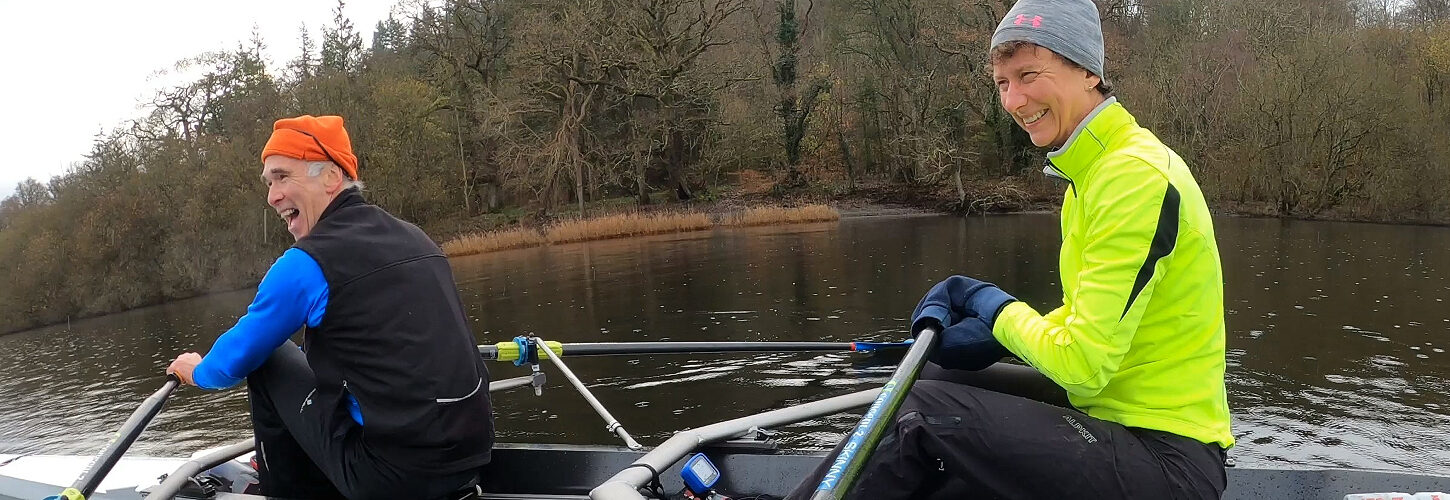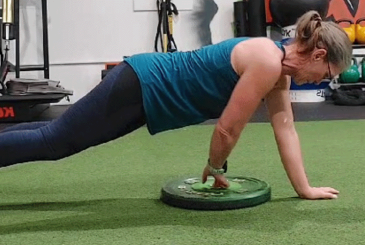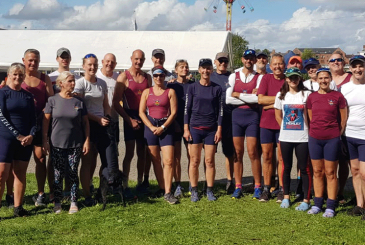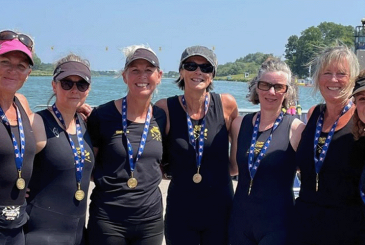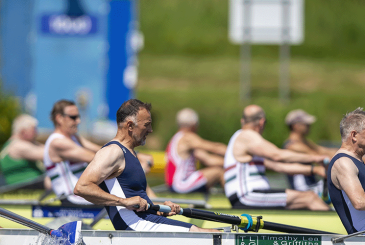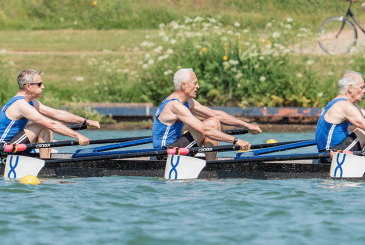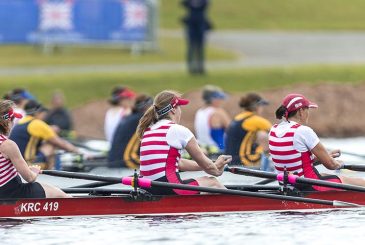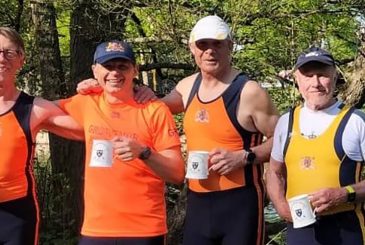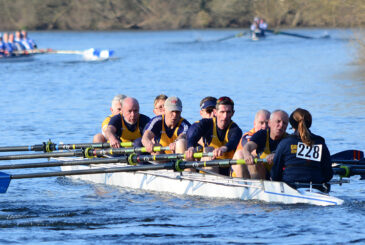With a full masters regatta season in the offing, now’s the time to sharpen up your racing skills! In the latest article in our masters series, Nick Hartland talks to rowers from Tideway Scullers School and Lakeland RC in Cumbria to gather some tips
There’s nothing like a spot of competition or a challenge to sharpen one’s appetite for rowing and training. And not only will it boost your fitness, strength and boat-moving skills, reaching for and achieving your targets will raise the level of enjoyment, camaraderie and satisfaction, while inspiring you to get out there and improve.
Training to race
“You need to be rowing together at higher intensity now, but if it’s just two outings a week, I’d recommend one high-intensity session and one doing longer pieces, which can be closer to anaerobic threshold than UT2, such as rate change over-distance work.”
She says training regularly with set targets will improve your capacity, mobility and quality of life as the body ages. And the social side is equally important.
“How good can I get? It’s racing and training for it that lifts standards”
“Share a cake afterwards”, she adds, “it tastes that much better chatting after an outing.”
Endurance, flexibility and core-strength resistance work can be done alone, but it helps to share the effort, even online. You can check out our Rower Development Guide for suggestions here.
“The more you can work out together the better,” says Rosie.
Retired GP Nick Cowan, 62, first rowed at university and returned in his 40s after being inspired by Talkin Tarn rowers when he was looking for a way of staying fit.
He talks about rowing and racing in a mixed double with Sam, saying: “How good can I get? It’s racing and training for it that lifts standards.
“We were fourth at halfway in a multi-lane race, and then Sam gave our ‘go’ call for turning on the afterburners and it was incredible, we’d never rowed as well and came through to win.
“To have that capacity at the end, when all that hard work pays off, was so satisfying. And that feeling, when it all comes together, came from setting a target and doing the work.”
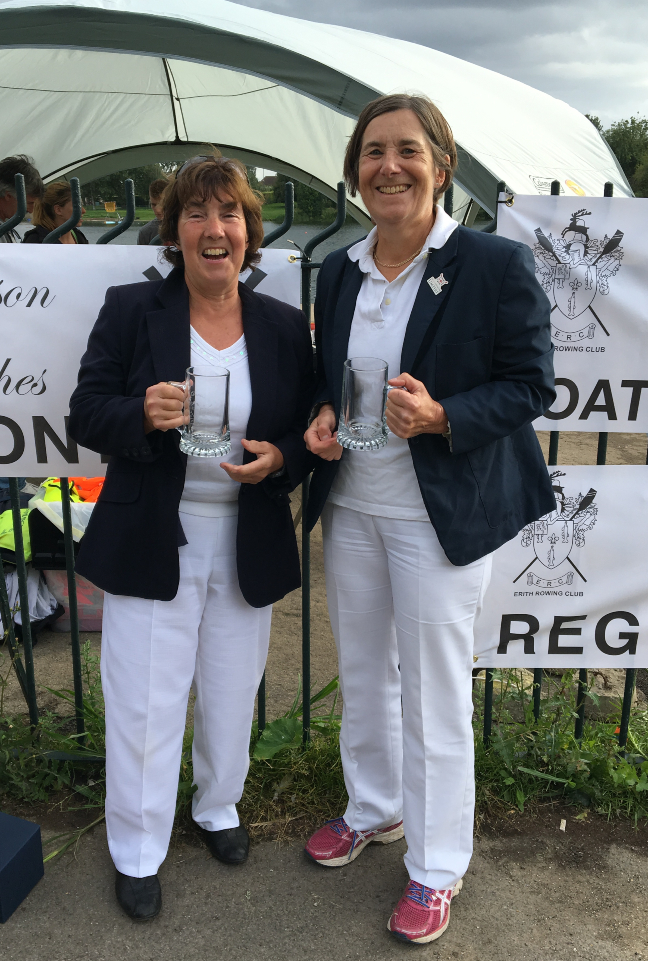
Walbrook and Tideway Scullers master Rosemary Thom started in her mid-40s alongside her children and was “hooked”.
“It’s the camaraderie and sharing a target that gets you motivated to go on the ergo and into the boat… we’ve all shared becoming grandmothers together! And with us older rowers, if you don’t do it now, when? What are you waiting for!”
Rosemary is excited about racing and umpiring at local regattas again, and, as an event organiser, is putting on beginner masters fours and quads at Borne Regatta in May.
Local regattas are particularly good preparation for IMs, agrees Rosie, adding: “And think about entering senior events, to get a feel for where you are, you can still be competitive. They have IM events at British Rowing Masters, but you need to race before you go there.”
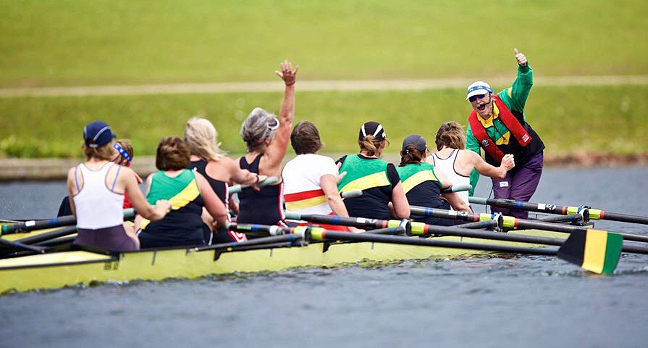
Boat time is crucial, says Nick, as that “harmony” can help beat potentially better crews. “And race lots at local regattas, it’s the best practice, as racing’s such a unique experience.
“To find oppo [as a mixed double] we enter younger masters and even open doubles, which we won at our first 2022 regatta at Chester-le-Street, beating two men!
Periodisation training, varying the intensity and workload, including rest days after an arduous session, can optimise performance. Find out more in our earlier article here.
“Talk about how you’ll go faster, decide what’s best, how you can start quickly and what’s your most effective rate”
For a high-intensity session, Rosie recommends sets of 250m, 500m or 750m high-rate pieces to develop regatta speed, plus 1kms to “understand” the masters race distance. And for an over-distance session to ’stress the body’, try 3 x 1500m progressive rate builds.
“Start initially at 22, lifting to 24, and then lift the rate earlier. Later you can start higher, but analyse it: what went well, what you need to work on.”
Also practise starts. A good tip is to follow your start pattern when paddling off, is to row shorter strokes, then lengthen to “bring the crew together”. Fast flat-out bursts, higher than race pace, also help coming up to an event, so when you compete you are confident in your race rate. And, of course, perfect your crew calls.
“It can just be one word – ‘length’, ‘catches’ – but you know what it means and can respond together,” adds Rosie.
Race warm-ups, to prepare physically and mentally, should also be practised, with half-stroke rate building a good sharpener. Building a race plan is also important, to find that bit more, such as in a close finish.
“If you aim to do 10/10/10 lifts at the end of a race, practise during training off the back of a piece,” she advises.
“The key question to ask is, are you making the boat go faster; does it work, and are you recovering efficiently and getting run?
“Talk about how you’ll go faster, decide what’s best for your boat, how you can start quickly and what’s your most effective rate. So, you have that blueprint.”
Nick, who met personal trainer Sam at a village social five years ago – “I taught her to scull, she taught me to train” – adds: “Now it’s time to go faster. We might do 4-5 x 500m pieces, 8 x 250m pieces, or 6-8 starts and 30 seconds. Don’t obsess about rating, though, it’s work in the water that counts. Do that and the rating follows the speed.”
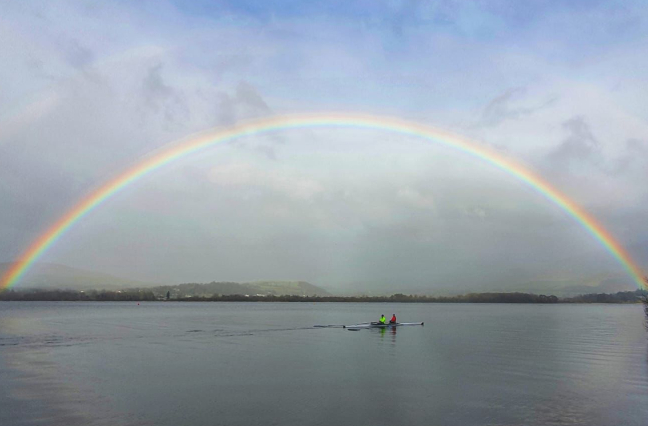
Rosemary says her boats might do 500m pieces, minutes on/off, or two minutes practising front end of the race, middle and back end. But starts are important,” she says, “particularly recreating a masters handicap countdown – we had a 13-second handicap in a Henley Masters final, but something magical happened and we pulled through!”
Competitions to target
The British Rowing Masters Championships, Henley Masters Regatta and the World Rowing Masters Regatta are targets for some, and she urges club rowers to consider them, as the experience of racing there is a reward in itself.
“Henley’s my favourite – high-level by and large, but it’s a lovely, relaxed atmosphere. Have a go, rowing along the booms is amazing.
“I thought he’s calling us ‘GB’… unbelievable!”
“And we’re talking about World Masters (Libourne, France). For camaraderie nothing beats it; clubs come together for crews, share trailers, boats, cheer one another on and then socialise. And the range of standards is vast in each race, so you’ll find competition. And you row on some of the most amazing courses, like Bled and Varese.”
Rosie adds: “There were 18,500 seats in Bled – a great party – and you can do multiple events and team up with other clubs.”
Nick recalls lining up with rowing royalty Sir Matthew Pinsent umpiring and calling over “Canada, Australia, GB… I thought he’s calling us ‘GB’… unbelievable!”
But it doesn’t just have to be racing that gets you up to speed, as cross training challenges can all provide motivational and fitness fuel.
Cross training challenges
Rosie coaches the ‘UK Gold’ women masters group drawn from across the country, who include good cyclists, a runner who tackled the Dragon’s Back Race mountaineering challenge across Wales.
“It’s good to mix it and setting yourself a challenge is fun and supports your rowing,” she says. “And it’s often more about the experience than racing.”
Challenges they have done include the 160km Tour du Lac on Lake Geneva, and touring races in Holland, Finland and Venice.
Star BC’s Miriam Taylor-Carter says for her “rowing has become a lifestyle”.
“It drives my goals… brings us together as great friends; giving us purpose to meet, with a collective objective of being as great as we always have been within the capacity of our gently ageing bodies.”
“Bassenthwaite, it’s just us, a few geese and the ospreys. You can scull 5km without looking round”
And she says it has broadened their sporting lives, with “yoga, cycling, skiing, hiking and other cross training efforts”.
It can be as simple as planning a river tour or a sportive bike ride together and building the mileage to complete it.
“Rowing events like the Boston Marathon, the row on Loch Ness and now coastal racing are worth considering,” adds Rosie. “Perhaps you can set up a link with a coastal club to borrow a boat.”
Former GP Nick says: “The views can be great on a bike, running or walking. It pays to do any sort of fitness work you enjoy. A benefit of rowing for an older body is that it’s non-impact, but go running if you’re good at it.
“Cross training means us gents with grey hair, or no hair, are working the cardiovascular system. Challenges keep you going. If you’ve always sculled, then challenge yourself to learn to sweep, and vice versa. They give you a purpose, and that’s important, especially once you retire.
“On Bassenthwaite, it’s just us, a few geese and the ospreys. You can scull 5km without looking round.
“So how about rowing the Lakes? That’s a lovely challenge.”


